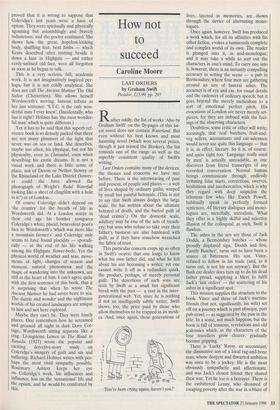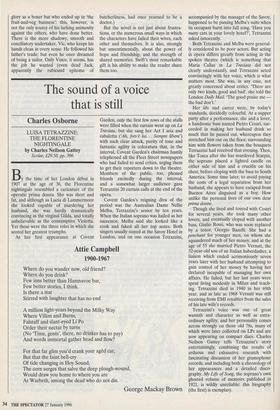How not to succeed
Caroline Moore
LAST ORDERS by Graham Swift Picador, £15.99, pp. 295 Rather oddly, the list of works 'Also by Graham Swift' on the fly-pages of this lat- est novel does not contain Waterland. But even without his best known and most haunting novel (which won several prizes, though it just missed the Booker), the list reminds one of the range as well as the superbly consistent quality of Swift's writing.
Last Orders contains many of the devices, the themes and concerns we have met before. There is the interweaving of past and present, of people and places — a web of lives shaped by ordinary guilts, warped by small but painful betrayals. (This is not to say that Swift always dodges the large scale. He has written about the ultimate betrayal of death, and the buried guilt of `dead crimes'.) On the domestic scale, adultery may be one of the acts of treach- ery; but sons who refuse to take over their father's business are also burdened with guilt, as if they have somehow wrenched the fabric of trust.
This particular concern crops up so often in Swift's oeuvre that one longs to know what his own father did, and what he felt about his son becoming a writer; yet one cannot write it off as a redundant quirk, the product, perhaps, of merely personal guilt. The desertions of such sons are seen by Swift as a small but significant break with the past — a rent in the inter- generational web. Yet, since he is nothing if not an intelligently subtle writer, Swift shows, too, the price paid by those who allow themselves to be trapped in its mesh- es. And, once again, these generations of `You've been crying again, haven't you?' lives, layered in memories, are shown through the device of alternating mono- logues.
Once again, however, Swift has produced a work which, for all its affinities with his other fiction, evokes a luminously complete and complex world of its own. The reader is plunged into it, in mid-monologue; and it may take a while to sort out the characters in one's mind. To carry one into it, however, there is an instantly compelling accuracy in setting the scene — a pub in Bermondsey, where four men are gathering around an urn of funeral ashes. The accuracy is of eye and ear, for visual details and the cadences of ordinary speech; but it goes beyond the merely meticulous to a sort of emotional perfect pitch. His evocations of London are never merely set- pieces, for they are imbued with the feel- ings of the observing characters.
Doubtless, some critic or other will write, accusingly, that 'real' butchers, fruit-and- veg sellers, accountants and car-salesmen would never use quite this language — that it is, in effect, literary. So it is, of course; and quite right too. 'Language really used by men' is actually unreadable, as one discovers from literal transcripts of any recorded conversation. Normal human beings communicate through endlessly irritating false starts, corrections, swerves, hesitations and incoherencies, which is why they regard with deep suspicion the inhuman few who, like Enoch Powell, habitually speak in perfectly formed sentences. All literary dialogues and mono- logues are, mercifully, unrealistic. What they offer is a highly skilful and selective illusion of the colloquial: as such, Swift is flawless.
The ashes in the urn are those of Jack Dodds, a Bermondsey butcher — whose proudly displayed sign, 'Dodds and Son, Family Butcher', turns out to have been a source of bitterness. His son, Vince, refused to follow in his trade (and, as it turns out, is not his son anyway). But the flash car-dealer does turn up to do his dead father proud, supplying a Merc to fulfil Jack's 'last orders' — the scattering of his ashes in a significant spot.
This mission supplies the structure to the book. Vince and three of Jack's wartime friends (but not, significantly, his wife) set off on a journey which is part obsequy, part pub-crawl — as suggested by the pun in the title. In a sense, not much happens; but the book is full of tensions, revelations and old jealousies which, as the characters of the four travellers grow clearer, gradually become gripping.
There is 'Lucky' Raysy, an accountant, the diminutive son of a local rag-and-bone man, whose deepest and thwarted ambition was once to be a jockey. He is the most obviously sympathetic and affectionate, and was Jack's closest friend: they shared their war. Yet he too is a betrayer. There is the embittered Lenny, who dreamed of escaping poverty after the war in a blaze of glory as a boxer but who ended up in 'the fruit-and-veg business': this, however, is not the only source of his lurking animosity against the others, who have done better. There is the more shadowy, smooth and conciliatory undertaker, Vic, who keeps his hands clean in every sense. He followed his father's trade; but even he once dreamed of being a sailor. Only Vince, it seems, has the job he wanted (even dead Jack, apparently the rubicund epitome of butcherliness, had once yearned to be a doctor.) But the novel is not just about frustra- tions, or the numerous small ways in which the characters have failed their wives, each other and themselves. It is also, strongly but unsentimentally, about the power of hope and friendship, and the strength of shared memories. Swift's most remarkable gift is his ability to make the reader share them too.



























































 Previous page
Previous page